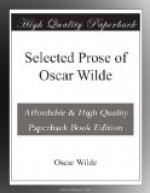I don’t regret for a single moment having lived for pleasure. I did it to the full, as one should do everything that one does. There was no pleasure I did not experience. I threw the pearl of my soul into a cup of wine. I went down the primrose path to the sound of flutes. I lived on honeycomb. But to have continued the same life would have been wrong because it would have been limiting. I had to pass on. The other half of the garden had its secrets for me also.—De Profundis.
THE GRAND ROMANTIC
It is when he deals with a sinner that Christ is most romantic, in the sense of most real. The world had always loved the saint as being the nearest possible approach to the perfection of God. Christ, through some divine instinct in him, seems to have always loved the sinner as being the nearest possible approach to the perfection of man. His primary desire was not to reform people, any more than his primary desire was to a relieve suffering. To turn an interesting thief into a tedious honest man was not his aim. He would have thought little of the Prisoners’ Aid Society and other modern movements of the kind. The conversion of a publican into a Pharisee would not have seemed to him a great achievement. But in a manner not yet understood of the world he regarded sin and suffering as being in themselves beautiful holy things and modes of perfection.
It seems a very dangerous idea. It is—all great ideas are dangerous. That it was Christ’s creed admits of no doubt. That it is the true creed I don’t doubt myself.
Of course the sinner must repent. But why? Simply because otherwise he would be unable to realise what he had done. The moment of repentance is the moment of initiation. More than that: it is the means by which one alters one’s past. The Greeks thought that impossible. They often say in their Gnomic aphorisms, ‘Even the Gods cannot alter the past.’ Christ showed that the commonest sinner could do it, that it was the one thing he could do. Christ, had he been asked, would have said—I feel quite certain about it—that the moment the prodigal son fell on his knees and wept, he made his having wasted his substance with harlots, his swine-herding and hungering for the husks they ate, beautiful and holy moments in his life. It is difficult for most people to grasp the idea. I dare say one has to go to prison to understand it. If so, it may be worth while going to prison.
There is something so unique about Christ. Of course just as there are false dawns before the dawn itself, and winter days so full of sudden sunlight that they will cheat the wise crocus into squandering its gold before its time, and make some foolish bird call to its mate to build on barren boughs, so there were Christians before Christ. For that we should be grateful. The unfortunate thing is that there have been none since. I make one exception,




